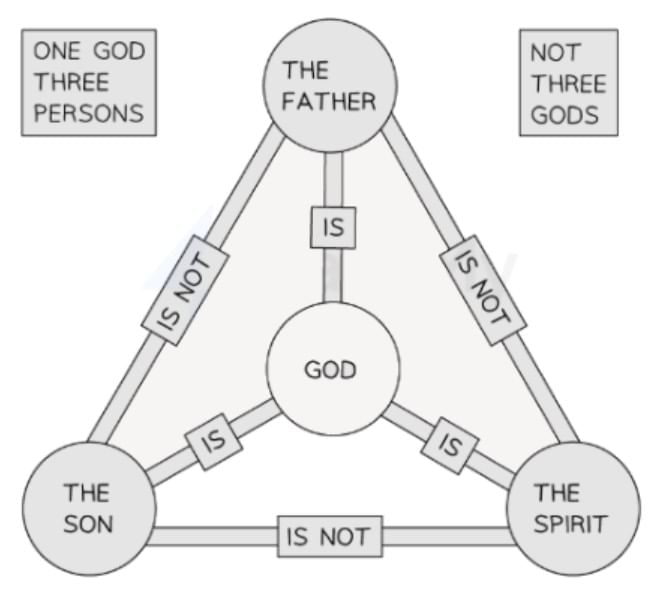Year 11 Exam > Year 11 Notes > Religion, Philosophy & Ethics for GCSE/IGCSE > The Trinity
The Trinity | Religion, Philosophy & Ethics for GCSE/IGCSE - Year 11 PDF Download
The Holy Trinity
The Holy Trinity refers to the Christian belief that God exists as three distinct persons in one essence, known as the Trinity:
- God, the Creator and Father
- Jesus Christ, the Son of God
- The Holy Spirit, God’s active presence in the world

Diagram of the Trinity
A diagram illustrating the Trinity shows God as the Father, the Son, and the Holy Spirit, with each being distinct from the others. The accompanying text states: "One God in Three Persons, not three separate Gods."
Understanding the Trinity
- Each person of the Trinity—Father, Son, and Holy Spirit—is worshipped and recognized as distinct, yet they are all part of the one true God.
- While the concept of the Trinity is not explicitly outlined in the New Testament, it distinguishes Christianity from other monotheistic faiths, such as Islam and Judaism, which do not accept the idea of God as three persons.
The Nicene Creed
- The Nicene Creed serves as a primary authority for the belief in the Trinity.
- This creed is recited by Christians across various denominations during their regular worship services.
- It was formulated in 325 CE at the Council of Nicaea, a gathering of bishops from around the world.
- The Creed declares: ‘We believe in one God, the Father Almighty … We believe in one Lord, Jesus Christ, the only Son of God … We believe in the Holy Spirit, the Lord and giver of life.’
- Additionally, the Creed affirms the unity of the Church, the practice of baptism, repentance for the forgiveness of sins, the resurrection of the dead, the final judgment, and eternal life.
The Impact of the Trinity on Christians
How the Trinity Shapes Christian Life Today
The belief in the Trinity profoundly influences Christians in the following ways:
- As the Father: God is seen as loving, which leads Christians to feel loved and to express love toward others, such as through charitable acts.
- As the Son: God became incarnate in Jesus, living and dying among humanity. This assures Christians that God understands their struggles and pain, encouraging them to turn to God in prayer for support.
- As the Holy Spirit: God provides spiritual strength, enabling Christians to sense the Spirit’s presence in their lives, which offers guidance and encouragement.
- The Trinity, being a mystery, allows Christians to accept that some aspects of God remain beyond human understanding.
- The Trinity provides clarity for various biblical events, such as the voice from heaven during Jesus’ baptism, and underscores the significance of baptizing in the name of the Father, Son, and Holy Spirit.
The document The Trinity | Religion, Philosophy & Ethics for GCSE/IGCSE - Year 11 is a part of the Year 11 Course Religion, Philosophy & Ethics for GCSE/IGCSE.
All you need of Year 11 at this link: Year 11
|
172 docs|3 tests
|
FAQs on The Trinity - Religion, Philosophy & Ethics for GCSE/IGCSE - Year 11
| 1. What is the significance of the Holy Trinity in Christianity? |  |
Ans. The Holy Trinity, which encompasses God the Father, God the Son (Jesus Christ), and God the Holy Spirit, is central to Christian theology. It represents the concept of one God in three distinct persons, emphasizing the relationship and unity among them. This foundational belief shapes Christian worship, understanding of salvation, and the nature of God, influencing how Christians experience their faith.
| 2. What is the Nicene Creed and its relation to the Trinity? |  |
Ans. The Nicene Creed is a formal statement of Christian faith that was established at the First Council of Nicaea in the 4th century. It articulates the core beliefs about the Trinity, affirming the divinity of Jesus Christ and the Holy Spirit, alongside the Father. The creed serves as a unifying declaration for Christians, reinforcing the understanding of the Trinity and countering heretical views of the time.
| 3. How does the doctrine of the Trinity impact Christian practices? |  |
Ans. The doctrine of the Trinity influences various Christian practices, including worship, prayer, and sacraments. For example, prayers are often offered in the name of the Father, Son, and Holy Spirit, reflecting the belief in their unity and distinct roles. Additionally, the understanding of the Trinity shapes liturgical practices and the interpretation of scripture, fostering a sense of community among believers.
| 4. Why is the concept of the Trinity considered a mystery in Christianity? |  |
Ans. The Trinity is considered a mystery because it describes a reality that transcends human understanding. While Christians affirm the truth of the Trinity, fully comprehending how one God can exist in three persons is beyond rational explanation. This mystery invites believers to embrace faith and worship, recognizing that not all aspects of the divine can be fully grasped by human reason.
| 5. What are some common misconceptions about the Trinity? |  |
Ans. Common misconceptions about the Trinity include the idea that it represents three separate gods or that it is a hierarchy among the Father, Son, and Holy Spirit. In reality, Christianity teaches that the Trinity is one God in three co-equal persons, each fully and equally God. Understanding these distinctions helps clarify the nature of God and reinforces the unity within the Trinity.
Related Searches




















